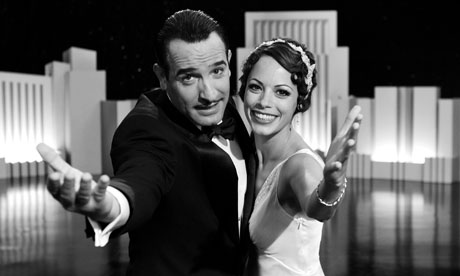 In the late nineteen-twenties a newspaper
publishes a picture of heart-throb silent screen star George Valentin (Jean
Dujardin) being kissed by Peppy Miller (Bérénice Bejo). The young aspiring
Peppy has yet to embark on her career in the new "talkies" but in a
touching subsequent encounter in George's dressing room, he gives her a gift.
It is the idea of how to make herself memorable and stand out from the
other actresses: quite simply, that she should always wear a beauty spot. This is a
love story, powered by the ambition and gratitude of Peppy, overcoming the
pride George.
In the late nineteen-twenties a newspaper
publishes a picture of heart-throb silent screen star George Valentin (Jean
Dujardin) being kissed by Peppy Miller (Bérénice Bejo). The young aspiring
Peppy has yet to embark on her career in the new "talkies" but in a
touching subsequent encounter in George's dressing room, he gives her a gift.
It is the idea of how to make herself memorable and stand out from the
other actresses: quite simply, that she should always wear a beauty spot. This is a
love story, powered by the ambition and gratitude of Peppy, overcoming the
pride George.
George refuses
to adapt to the new talkies medium and this soon puts him into decline, losing
his wife, wealth and self-esteem. Peppy, now wealthy but living alone in her
giant mansion, does not forget him and ... well you'll have to watch this
brilliant film to find out what happens.
Whilst deploying all the modern techniques of modern cinema
production: camera angles, editing and production, this film cleverly exploits
the recursive device of being produced in square aspect ratio black and white
silent movie format. Reminding us how powerful and expressive silent
movies can be, this emphasises Georges dilemma: why do we need the talkies
when the silent movie offers all that is needed. The story is told for the most
part from the facial expressions of the actors with a whit and elegance far
more sophisticated than the standards of the 1920, it must be said, but the
constraints of the medium do not prevent the heart-warming story from bursting
through with an impact that defies the budgets of so many modern films.
I suspect that this film is not the start of a new genre but will
never-the-less be remembered alongside many seminal cinematographic experiments.